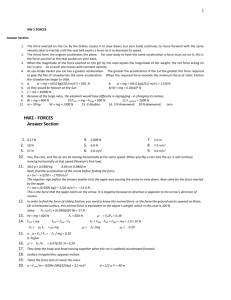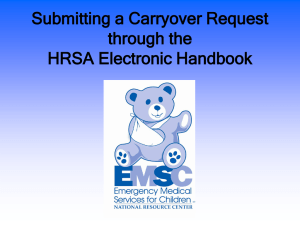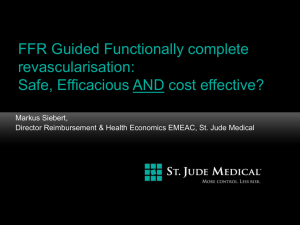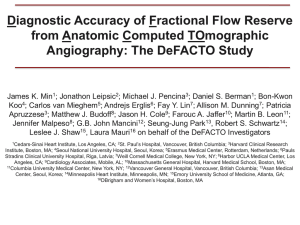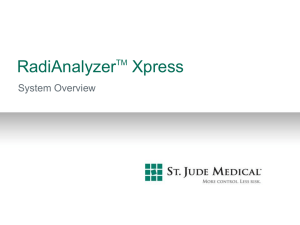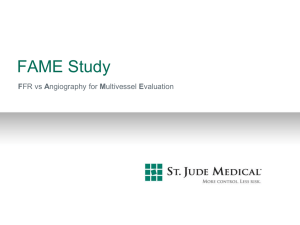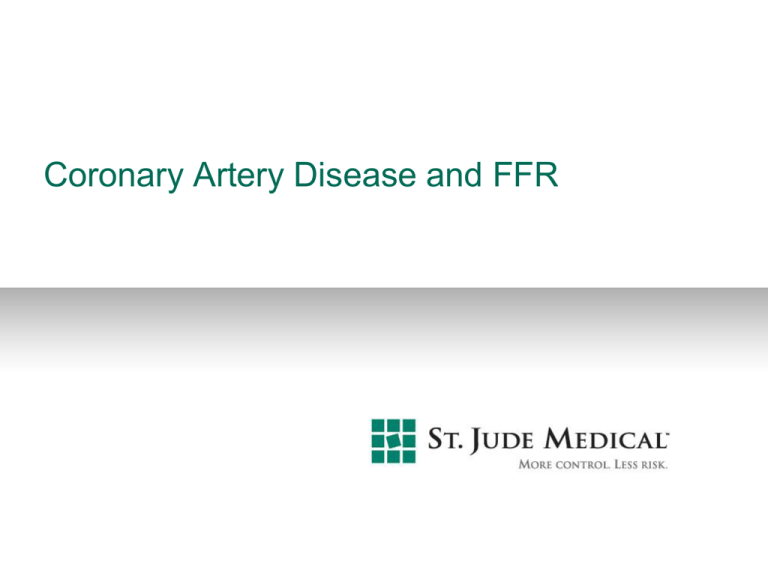
Coronary Artery Disease and FFR
Module Content
2
Symptoms
At the Doctor
In the Cath Lab
Cardiac Catheterization
What Does an Angiogram Reveal?
Treatment Alternatives
Decision Making
Equipment Required
FFR
CUT-OFF
Validation
Complement to Angiography
Intervention
Checking Treatment Results
Objective Proof
Optimal Treatment
Symptoms
A patient contacts his physician because he experiences chest pain
during physical exercise.
3
At the Doctor
If the physician suspects heart disease after have performed an
exercise test (e.g. ECG while walking on a treadmill) he refers the
patient for a coronary angiogram.
4
In the Cath Lab
The patient goes to the
coronary cath lab for an
angiogram to check for
narrowings in the arteries.
5
Cardiac Catheterization
X-ray opaque liquid is injected
into the coronary arteries to be
able to view them ”live” on a
screen.
6
Cardiac Catheterization
The angiogram shows an image
of the coronary arteries.
7
Cardiac Catheterization
The images might show some
disease in one or more of the
major coronary arteries.
8
What Does an Angiogram Reveal?
Are all the narrowings serious
enough to require treatment?
Which one is causing the
patient’s symptoms?
9
Treatment Alternatives
If none of the vessels have really severe
narrowings:
- Medication only?
If all 3 vessels are severely narrowed:
- Bypass surgery?
If only 1 or 2 of the vessels are severely narrowed:
- One or more coronary stents?
10
Decision Making
The cardiologist may use
FFR to help make a decision.
11
Equipment Required
PressureWire Sensor
to measure pressure
insidethe coronary arteries
12
RadiAnalyzer Xpress
to calculate the results of
pressure measurements and
show them on a screen
Hyperemic drug
to simulate exercise
FFR
PressureWire sensor is placed inside the coronary
artery, positioned beyond the narrowed area.
PressureWire Sensor
in the artery.
13
FFR
Hyperemia is induced to simulate exercise.
RadiAnalyzer Xpress then calculates how much the
narrowing is impeding blood flow at maximum
exercise.
FFR result
Pressure is measured
beyond the narrowings.
14
CUT-OFF
If FFR is above 0.75, the blood flow past the
narrowing is at least 75% normal.
FFR >0.75:
This narrowing is very
unlikely* the cause of the
patient’s symptoms.¹
* Sensitivity
88%
“Measurement of fractional flow reserve to
assess the functional severity of coronaryartery stenoses.”
Pijls, N. H. et al, N Engl J Med : 1996; 334: 26:
1703-1708
15
CUT-OFF
If FFR is lower than 0.75, then the flow of blood
able to get past the narrowing is less than 75%
FFR 0.75:
This narrowing needs
to be treated.
* Specificity
100%
“Measurement of fractional flow reserve to
assess the functional severity of coronaryartery stenoses.”
Pijls, N. H. et al, N Engl J Med : 1996; 334: 26:
1703-1708
16
Validation
FFR has been thoroughly validated
in scientific studies:
Measurement of fractional flow reserve to
assess the functional severity of coronaryartery stenoses
Pijls, N. H, J. et al, New England Journal of
Medicine 1996 ; 334; 26: 1703-1708
”Fractional Flow Reserve A Useful Index to
Evaluate the Influence of an Epicardial
Coronary Stenosis on Myocardial Blood Flow”
Pijls et al, Circulation 1995;92:3183-3193.
17
Validation
FFR has been further validated in scientific
studies in the following clinical
conditions:
18
Multivessel Disease
Left Main Disease
Serial Lesions
Acute Coronary Syndromes
Bifurcations/jailed side-branches
Post stent assessment
Complement To Angiography
FFR has been proven superior to angiography alone:
Study showed that visual assessment of an angiogram by
experienced interventional cardiologists cannot accurately predict
the significance of most moderate narrowings.
Experienced physicians were wrong in their visual estimations
about 50% of the time. The specificity of visual assessment was
only 47% compare with FFR: 100%.
Brueren, B. R et al, International Journal of Cardiology, 2002: 18; 2: 73-76
19
Intervention
A stent may be placed in a coronary artery to open
a narrowing.
20
Checking Treatment Results
Once a stent has been placed in the artery, the FFR should be as
close as possible to 1.0.
FFR result
21
Objective Proof
The FFR results provide objective proof for
the interventionalist, the patient, the
referring doctor and the surgeon.
22
Optimal Treatment
FFR helps the patient get the best treatment
for their heart condition.
23
Rx Only
Prior to using these devices, please review the Instructions for Use for a complete listing of
indications, contraindications, warnings, precautions, potential adverse events, and
directions for use.
Product referenced is approved for CE Mark
RadiAnalyzer Xpress, PressureWire Certus are designed, developed and manufactured by
St Jude Medical Systems AB. Patent Pending. Unless otherwise noted, ™ indicates a
registered or unregistered trademark or service mark owned by, or licensed to, St. Jude
Medical, Inc. or one of its subsidiaries. RadiAnalyzer Xpress, PressureWire Certus, RADI,
ST. JUDE MEDICAL, the nine-squares symbol, and MORE CONTROL. LESS RISK. are
registered and unregistered trademarks and service marks of St. Jude Medical, Inc. and its
related companies.
©2010 St. Jude Medical, Inc. All rights reserved.
24
This is the last page of this module.
25

